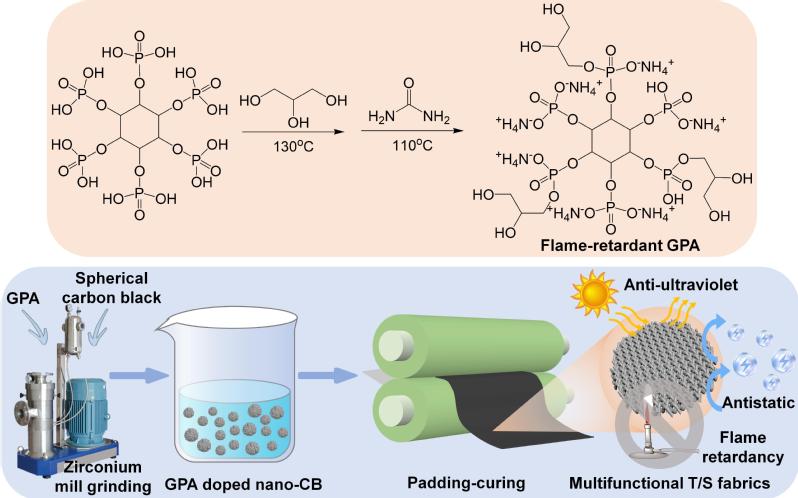Multifunctional coating for polyester/spandex fabric with phytate salt doped carbon black dispersion
Xian-Wei Cheng*1,2, Jia-Yi Song1, Zheng-Yi Wang1, Jin-Ping Guan*1, Ya-Wei Zhu1
1 Key Laboratory of Flame Retardancy Finishing of Textile Materials (CNTAC), College of Textile and Clothing Engineering, Soochow University, 199 Renai Road, Suzhou 215123, China
2 Jiangsu Engineering Research Center of Textile Dyeing and Printing for Energy Conservation, Discharge Reduction and Cleaner Production (ERC), Soochow University, 199 Renai Road, Suzhou 215123, China
* Corresponding author: E-mail: [email protected]; [email protected]
The development of multifunctional protective polyester/spandex (T/S) fabrics is both interesting and challenging. In this study, a novel intumescent flame-retardant glyceryl phytate ammonium salt (GPA) was synthesized by using phytic acid. Subsequently, the carbon black (CB) dispersions doped with GPA were prepared and utilized to fabricate black and multifunctional T/S fabrics through a facile pad-curing method. The chemical structure of GPA, color characteristics, anti-ultraviolet and antistatic properties, combustion behavior, flame retardancy and mode of action of the coated T/S fabrics were investigated. The dispersed CB/GPA imparted a pure black color and good color fastness to the coated T/S fabrics. The coated T/S fabrics also exhibited significantly enhanced antistatic and anti-ultraviolet performance (UPF above 800) because of the homogeneous CB coating. Additionally, the coated T/S fabrics demonstrated self-extinguishing ability and a reduced damaged length of approximately 7.5 cm without molten droplets, benefiting from the synergistic combination of GPA and CB. The formation of cross-linked char networks in condensed phase and the trapping of combustible radicals in gas phase synergistically enhanced the flame retardancy of coated T/S fabrics. This study offers a facile and novel strategy to increase the multifunctionality of T/S fabrics and expand their potential applications.

//doi.org/10.1016/j.colsurfa.2024.135809.
